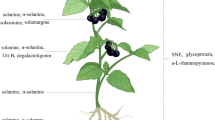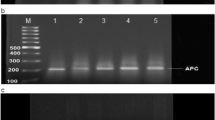Abstract
γ-Aminobutyric acid (GABA) is a natural non-protein amino acid, which broadly exists in many plant parts and is widely used as an ingredient in the food industry. In mammals, it is widely distributed in central nervous system and non-neural tissues. In addition to a primary inhibitory neurotransmitter in the central nervous system, endogenous GABA content has been found to be elevated in neoplastic tissues in colon cancer. However, the effect of extraneous GABA on colon cancer has rarely been reported. In this study, we found the inhibitory effects of GABA on the proliferation of colon cancer cells (CCCs). The amino acid also suppressed metastasis of SW480 and SW620 cells. To further study the correlated mechanism, we analyzed the changes in cell cycle distribution and found that GABA suppressed cell cycle progression through G2/M or G1/S phase. Furthermore, RNA sequencing analysis revealed GABA-induced changes in the mRNA expression of 30 genes, including EGR1, MAPK4, NR4A1, Fos, and FosB, in all the three types of CCC. Importantly, GABA enhanced the anti-tumor efficacy of oxaliplatin (OXA) in subcutaneous xenograft tumor model in nude mice. The data suggest that GABA inhibits colon cancer cell proliferation perhaps by attenuating EGR1-NR4A1 axis, EGR1-Fos axis, and by disrupting MEK-EGR1 signaling pathway. This work reveals the pharmacological value of GABA derived from food and suggests that exogenous GABA might play an auxiliary role in polychemotherapy of colon cancer.






Similar content being viewed by others
References
Jemal A, Siegel R, Xu J, Ward E. Cancer statistics, 2010. CA Cancer J Clin. 2010;60:277–300.
Jin K, Gao W, Lu Y, Lan H, Teng L, Cao F. Mechanisms regulating colon cancer cell metastasis into liver (review. Oncol Lett. 2012;3:11–5.
Stefanska B, Karlic H, Varga F, Fabianowska-Majewska K, Haslberger A. Epigenetic mechanisms in anti-cancer actions of bioactive food components—the implications in cancer prevention. Br J Pharmacol. 2012;167:279–97.
Al-Wadei HA, Ullah MF, Al-Wadei M. GABA (gamma-aminobutyric acid), a non-protein amino acid counters the beta-adrenergic cascade-activated oncogenic signaling in pancreatic cancer: a review of experimental evidence. Mol Nutr Food Res. 2011;55:1745–58.
Ippolito JE, Piwnica-Worms DA. Fluorescence-coupled assay for gamma aminobutyric acid (GABA) reveals metabolic stress-induced modulation of GABA content in neuroendocrine cancer. PLoS One. 2014;9:e88667.
Kim JI, Ganesan S, Luo SX, Wu YW, Park E, Huang EJ, et al. Aldehyde dehydrogenase 1a1 mediates a GABA synthesis pathway in midbrain dopaminergic neurons. Science. 2015;350:102–6.
Hackett CS, Quigley DA, Wong RA, Chen J, Cheng C, Song YK, et al. Expression quantitative trait loci and receptor pharmacology implicate Arg1 and the GABA-A receptor as therapeutic targets in neuroblastoma. Cell Rep. 2014;9:1034–46.
Zhang X, Zhang R, Zheng Y, Shen J, Xiao D, Li J, et al. Expression of gamma-aminobutyric acid receptors on neoplastic growth and prediction of prognosis in non-small cell lung cancer. J Transl Med. 2013;11:102.
Joseph J, Niggemann B, Zaenker KS, Entschladen F. The neurotransmitter gamma-aminobutyric acid is an inhibitory regulator for the migration of SW 480 colon carcinoma cells. Cancer Res. 2002;62:6467–9.
Kleinrok Z, Matuszek M, Jesipowicz J, Matuszek B, Opolski A, Radzikowski C. GABA content and GAD activity in colon tumors taken from patients with colon cancer or from xenografted human colon cancer cells growing as s.C. Tumors in athymic nu/nu mice. J Physiol Pharmacol. 1998;49:303–10.
Yan H, G Tang, H Wang, L Hao, T He, X Sun, et al. DNA methylation reactivates GAD1 expression in cancer by preventing CTCF-mediated polycomb repressive complex 2 recruitment. Oncogene. 2015.
Du AY, Zhao BX, Yin DL, Zhang SL, Miao JY. Discovery of a novel small molecule, 1-ethoxy-3-(3,4-methylenedioxyphenyl)-2-propanol, that induces apoptosis in A549 human lung cancer cells. Bioorg Med Chem. 2005;13:4176–83.
Mareel M, Oliveira MJ, Madani I. Cancer invasion and metastasis: interacting ecosystems. Virchows Arch. 2009;454:599–622.
Qian L, Murakami T, Kimura Y, Takahashi M, Okita K, Saikosaponin A. Induced cell death of a human hepatoma cell line (HuH-7): the significance of the “sub-G1 peak” in a DNA histogram. Pathol Int. 1995;45:207–14.
Tian H, Wu JX, Shan FX, Zhang SN, Cheng Q, Zheng JN, et al. Gamma-aminobutyric acid induces tumor cells apoptosis via GABABR1.Beta-arrestins.JNKs signaling module. Cell Biochem Biophys. 2015;71:679–88.
Wu J, Liu J, Jia R, Song H. Nur77 inhibits androgen-induced bladder cancer growth. Cancer Investig. 2013;31:654–60.
Li YH, Liu Y, Li YD, Liu YH, Li F, Ju Q, et al. GABA stimulates human hepatocellular carcinoma growth through overexpressed GABAA receptor theta subunit. World J Gastroenterol. 2012;18:2704–11.
Zhang D, Li X, Yao Z, Wei C, Ning N, Li J. GABAergic signaling facilitates breast cancer metastasis by promoting ERK1/2-dependent phosphorylation. Cancer Lett. 2014;348:100–8.
Baron V, Duss S, Rhim J, Mercola D. Antisense to the early growth response-1 gene (Egr-1) inhibits prostate tumor development in TRAMP mice. Ann N Y Acad Sci. 2003;1002:197–216.
Zhang H, Chen X, Wang J, Guang W, Han W, Zhang H, et al. EGR1 decreases the malignancy of human non-small cell lung carcinoma by regulating KRT18 expression. Sci Rep. 2014;4:5416.
Liao Y, Shikapwashya ON, Shteyer E, Dieckgraefe BK, Hruz PW, Rudnick DA. Delayed hepatocellular mitotic progression and impaired liver regeneration in early growth response-1-deficient mice. J Biol Chem. 2004;279:43107–16.
Hedrick E, Lee SO, Kim G, Abdelrahim M, Jin UH, Safe S, et al. Nuclear receptor 4A1 (NR4A1) as a drug target for renal cell adenocarcinoma. PLoS One. 2015;10:e0128308.
Lu C, Shen Q, DuPre E, Kim H, Hilsenbeck S, Brown PH. cFos is critical for MCF-7 breast cancer cell growth. Oncogene. 2005;24:6516–24.
Shahzad MM, Arevalo JM, Armaiz-Pena GN, Lu C, Stone RL, Moreno-Smith M, et al. Stress effects on FosB- and interleukin-8 (IL8)-driven ovarian cancer growth and metastasis. J Biol Chem. 2010;285:35462–70.
Long XE, Gong ZH, Pan L, Zhong ZW, Le YP, Liu Q, et al. Suppression of CDK2 expression by siRNA induces cell cycle arrest and cell proliferation inhibition in human cancer cells. BMB Rep. 2010;43:291–6.
Fu J, Cheng L, Wang Y, Yuan P, Xu X, Ding L, et al. The RNA-binding protein RBPMS1 represses AP-1 signaling and regulates breast cancer cell proliferation and migration. Biochim Biophys Acta. 2015;1853:1–13.
Li D, Ilnytskyy Y, Kovalchuk A, Khachigian LM, Bronson RT, Wang B, et al. Crucial role for early growth response-1 in the transcriptional regulation of miR-20b in breast cancer. Oncotarget. 2013;4:1373–87.
Nie J, Pei D. Direct activation of pro-matrix metalloproteinase-2 by leukolysin/membrane-type 6 matrix metalloproteinase/matrix metalloproteinase 25 at the asn(109)-Tyr bond. Cancer Res. 2003;63:6758–62.
Huober JB. Thurlimann. The role of combination chemotherapy in the treatment of patients with metastatic breast cancer. Breast Care (Basel). 2009;4:367–72.
Acknowledgments
This work was supported by grants from the National Natural Science Foundation of China (Grant Nos. 81071680 and 81272280), Shanghai Pujiang Outstanding Young Scientist Project.
Author information
Authors and Affiliations
Corresponding author
Additional information
Lihua Song, Aiying Du,·and Ying Xiong contributed equally to this work.
Electronic supplementary material
Supplementary Fig. 1
Images showing the morphology of migrated or invaded SW620 cells. SW620 cells were planted in the wells of 24-well Transwell chambers and treated with GABA as described in the “Materials and methods” section. Twenty-four hours after treatment, images were obtained by using under an Olympus IX73 Phase Contrast Microscope (Olympus Corporation, Tokyo, Japan). Images in the left panel (a, c, e, g) were magnified on the right (b, d, f, h), respectively. Scale bar 1 mm (DOCX 294 kb)
Rights and permissions
About this article
Cite this article
Song, L., Du, A., Xiong, Y. et al. γ-Aminobutyric acid inhibits the proliferation and increases oxaliplatin sensitivity in human colon cancer cells. Tumor Biol. 37, 14885–14894 (2016). https://doi.org/10.1007/s13277-016-5367-5
Received:
Accepted:
Published:
Issue Date:
DOI: https://doi.org/10.1007/s13277-016-5367-5




